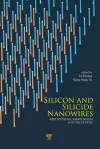
Silicon and Silicide Nanowires
2 contributors - Hardback
£115.00
Yu Huang is a faculty member in the Department of Materials Sciences and Engineering at the University of California, Los Angeles (UCLA), USA. She received her PhD in physical chemistry from Harvard University, USA. Her research focuses on the fundamental principles governing nanoscale material synthesis and assembly at the molecular level, which can be utilized to design nanostructures and nanodevices with unique functions and properties to address critical challenges in electronics, energy science, and biomedicine. She has received several recognitions including MRS student award, the Grant Prize Winner of Collegiate Inventors’ Competition, the IUPAC Young Chemist Prize, Lawrence Postdoctoral Fellowship, MIT Technology Review World’s Top 100 Young Innovator Award, NASA Nanotech Brief Nano 50 Innovator award, the Kavli Fellowship, the Sloan Fellowship, the PECASE, DARPA Young Faculty Award and, the NIH Director’s New Innovator Award.
King-Ning Tu received his PhD in applied physics from Harvard University in 1968 and was associated with IBM T. J. Watson Research Center for 25 years before joining the UCLA, USA, in 1993. He is distinguished professor in the Department of Materials Science and Engineering and the Department of Electrical Engineering at the UCLA. He has over 500 journal publications with citations over 18,000 and h-factor of 74. He received the TMS John Bardeen Award in 2013. He has co-authored the textbook Electronic Thin Film Science and authored the books Solder Joint Technology: Materials, Properties, and Reliability and Electronic Thin-Film Reliability. His research interests are focused on metal–silicon reactions, solder joint reactions, point-contact reactions in nanowires, polarity effect of electromigration on interfacial reactions, and kinetic theories of interfacial reactions.